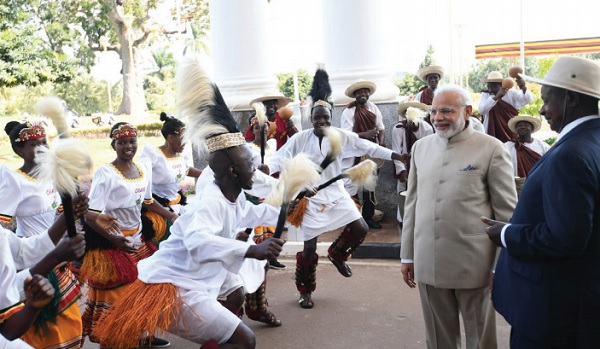
Africa is becoming a crucial player in India’s ambitious quest for global economic dominance. Through strong trade investments, expanding diplomatic relations, and strategic military partnerships, India is making significant investments in the continent as part of its broader global economic strategy.
SPECIAL REPORT | BIRD AGENCY | India is growing its investment and nurturing diplomatic alliances with a range of countries in Africa, recognizing the continent as a key component in its pursuit of superpower status.
In the latest move, Ethiopia’s ambassador to India disclosed to The Print, an Indian news outlet recently, that the two countries are “in the final stages of clinching defence cooperation.”
This is just one of several recent joint military collaborations. Others include events such as AFINDEX 2023, held in March 2023, which brought together 124 participants from 25 African countries to develop relationships with Indian military forces.
India also has some level of joint military programs in other countries, such as Botswana, Lesotho, Zambia, Uganda, Namibia, Tanzania, Mauritius and the Seychelles, among others, according to the Indian Council of World Affairs.
Notably, last year Nigeria approved a US$1 billion partnership agreement with the Indian government to help the Defense Industries Corporation of Nigeria attain 40% self-sufficiency in local manufacturing and production of defence equipment in three years.
However, military and defence collaborations are just a part of the strategic investments New Delhi is making in Africa, in addition to increased trade investments and diplomatic support, as India increasingly woos Africa.
According to Paul Nantulya, a research associate at the Africa Center for Strategic Studies (ACSS), Indo-African ties extend to other aspects such as culture, education, trade, technical cooperation, energy, agriculture, maritime security and peacekeeping.
“India also builds capacity for good governance through institutions like the India International Institute of Democracy and Election Management,” Nantulya shared in an article available on the ACSS website.
India is Africa’s third-largest trading partner behind the EU and China and India’s trade with African nations has grown 18% per year over the last 20 years, hitting US$103 billion in 2023.
Notably, trade with some individual countries has grown even more exponentially in recent years. For instance, bilateral trade between Tanzania and India is projected to top US$7 billion in the current financial year, according to Manoj Verma, an official at the Indian High Commission in Tanzania, as reported by The Citizen, a Tanzanian news outlet.
“For the current 2023–24 fiscal year, trade statistics have already crossed USD5.7 billion by December 2023,” The Citizen reports.
India’s promising economic growth and people-centred diplomacy present critical advantages for the continent.
While India’s increasing interest in Africa cannot threaten major influencers such as China, it presents an opportunity for Africa to diversify its trade and investment partners from traditionally dominant markets such as China and Europe.
Despite global challenges like inflation and geopolitical tensions, India’s economy showed resilience in 2023, outperforming major economies. The Economic Times reported 7.7% GDP growth in the first six months of this fiscal year.
This growth remains promising, with economic projections showing the country will undergo rapid growth in the future. A 2024 analysis by investment bank Jefferies shows India could surpass Japan and Germany, positioning itself as the world’s third-largest economy by 2027.
Africa could play a crucial role in fueling India’s growth, especially through clean energy sources. The Institute of Security Studies highlights that Africa offers affordable fuels and minerals while also serving as a potential ‘carbon sink’ through offsetting initiatives.
Enhanced diplomatic ties between India and Africa are evidenced by the increased number of Indian embassies and missions on the continent, rising from 29 in 2017 to 47 today. At the 2023 G20 Summit in New Delhi, Prime Minister Narendra Modi supported the proposal for the AU to have permanent G20 membership, calling it “a significant stride towards a more inclusive global dialogue.”
More investment can be expected in the future. In September 2023, investors from India pledged to invest billions in Nigeria. Jindal Steel and Power committed US$3 billion to the steel sector and Indorama Corp added US$8 billion for petrochemical expansion, according to Reuters. The Confederation of Indian Industry aims to more than double its economic impact in Africa to US$150 billion by 2030.
Beyond initiatives with individual countries, India is also leveraging agreements and multilateral institutions such as the African Development Bank to grow its influence through credit offerings and other non-credit programs.
Last year, the Indian government announced it would contribute US$2 million to the Africa Digital Financial Inclusion Facility (ADFI). ADFI works to scale innovative digital financial solutions under the three broad strategic pillars of infrastructure, policies and regulations, and product innovation.
A 2023 Bloomberg report revealed that Africa was the second-largest credit recipient from India, with 42 countries receiving about US$32 billion of credit from the Asian country in the last decade.
“The South Asian nation has also opened up 195 project-based lines of credit worth about $12 billion across Africa, three times the number it has in its own region in the last decade.”
****
SOURCE: Bird Agency
 The Independent Uganda: You get the Truth we Pay the Price
The Independent Uganda: You get the Truth we Pay the Price



